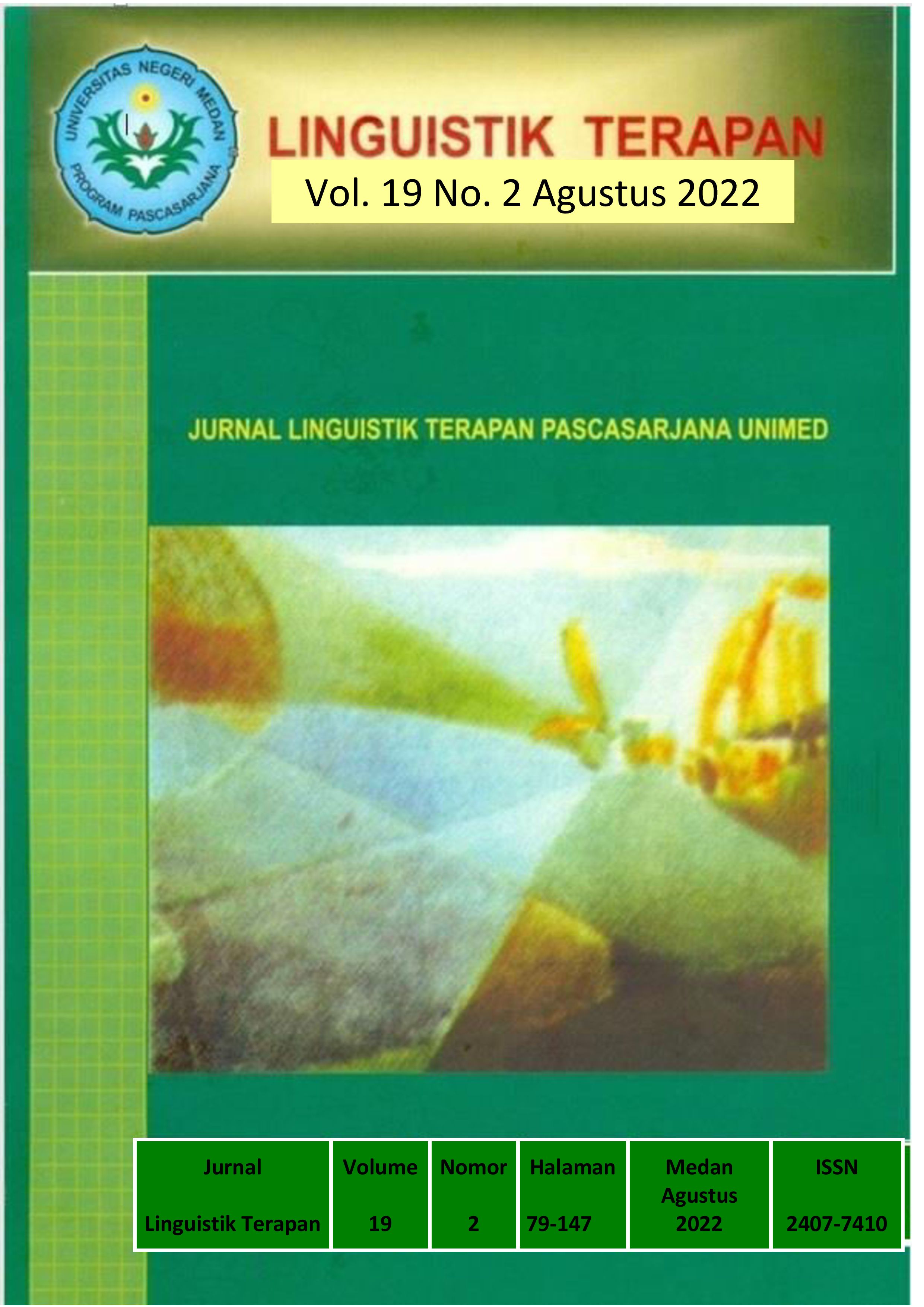MODALITY REALIZATION IN THE TEXTS MARKOBAR IN PABAGAS BORU CEREMONY AS MANDAILING ORAL TRADITION
DOI:
https://doi.org/10.24114/lt.v19i2.38407Keywords:
Keywords, Modality Realization, Markobar in Pabagas Boru Ceremony, Mandailing Oral Tradition.Abstract
ABSTRACT Markobar is one of Mandailing oral traditions. Markobar means œspeaking. The study aimed as certain how modalities were realized in the texts of markobar in pabagas boru ceremony, The study was a qualitative research. the participants comprising 14 positions in markobar in pabagas boru ceremony, two atobangon (expert of markobar) in Padangsidimpuan were the data source of study. The data of the study were 66 clauses containing modality delivered by participants orally. The theory used was modality theory proposed by Halliday (2004). In addition, the data gained were analyzed based on Miles, Huberman, and Saldana (2014) namely, data collection, data condensation, data display, and conclusion drawing/ verification. Thus, the study showed that there were three categories of modality realization which could be found in markobar in pabagas boru namely, auxiliary verb (32), lexical verb (10), and adverbial phrase (24). Then, modality realized in markobar in pabagas boru ceremony was dominated by auxiliary verbs (48%). Then, the least modal was lexical verb (15%).References
Ary. D, Jacobs.L C and Sorensen CK. (2009). Introduction to Research Education 8th Edition. Wadsworth Cengage Learning: USA
Blackstone, A. (2012) Principles of sociological inquiry: Qualitative and quantitative methods. Saylor Foundation. Retrieved from: https://saylordotorg.github.io/text_principles-of-sociological-inquiry-qualitative-and-quantitative-methods/ Shared under CC-BY-NC-SA 3.0 License (https://creativecommons.org/licenses/by-nc-sa/3.0/)
Bogdan,R.C and Biklen.S.K. (1992). Qualitative Research For Education: In Introduction to Theory and Method. Needham Heights: Allyn and Bacon
Denzin N.K, Lincoln Y.S (1994). Introduction: Entering the field of qualitative research. In Denzin NK, Lincoln YS (Eds) Handbook of Qualitative Research. Thousand Oaks, Sage Publications.
Downing, Angela and Locke, Philip. (2006). English Grammar. New York: Routledge.
Endarto, I. T. (2017). Systemic functional linguistics: A brief introduction. Forum Diskusi Basantara Yogyakarta. Forum Diskusi Basantara Yogyakarta. Retrieved from www.academia.edu/34037346/ Systemic_Functional_Linguistics_A_Brief_Introduction
Fattah, H.A. (2011). A Formal-Functional Analysis of the English Modal Auxiliaries. Jordan Journal of Modern Language and Literature. Vol. 3 No. 1. Page 39-63.
Halliday, M.A.K. (1985). An Introduction to Functional Grammar. London: Edward Arnold.
Halliday, M.A.K. and Christian M.I.M. (2004). An Introduction to Functional Grammar (3rd Ed.). London: Hodder Arnold.
Huddleston, R., and Geoffrey P. (2002). The Cambridge Grammar of the English Language. Cambridge: Cambridge University Press.
Huddleston, R., and Geoffrey, K. Pullum. (2005) A Student's Introduction to English Grammar. Cambridge University Press.
Hutomo, S.S. (1991). Mutiara yang Terlupakan. Surabaya: HISKI
Ibrahim. (2019). Family System of Mandailing in the Kecamatan Rumbai Pesisir Kota Pekanbaru. JOM FKIP “ UR. Vol. 6 (2). Page 1-8.
Lord. (1995). Oral Tradition and Hispanic Literature: Essays in Honor of Samuel G. Armistead (Albert Bates Lord Studies in Oral Tradition) 1st Edition. England: Routledge
Lubis, F. K. (2014). Kearifan Mandailing Dalam Tradisi Markobar. BAHAS, 25(3), 68“82. https://doi.org/10.4324/9781315853178.
Lulu, U.A., and Misnadin. (2021). An Analysis of Modality In Emma Watson and Michael Kimmel™s Speech Texts. Prosodi: Jurnal Ilmu Bahasa dan Sastra. Vol 5 (1). Page 23-34.
Lyons, J. (1981). Language and Linguistics: Cambridge University Press.
Mayring, P. (2000). Qualitative Inhaltsanalyse. Grundlagen und Techniken (7th edition, first edition 1983). Weinheim: Deutscher Studien Verlag.
Miles, M. B., A. Michael, H., and Johnny, S. (2014). Qualitative Data Analysis: A Method s Source book. 3rd Edition. America: Sage Publication.
Nasution, P. (2005). Adat Budaya Mandailing dalam Tantangan Zaman. Medan: Frokala Prov Sumatera Utara.
Palmer, F.R. (1986). Mood and Modality. Cambridge: Cambridge University Press.
Parinduri, M. B. (2013). Panduan Markobar Dalam Budaya Mandailing. Medan: Deli Grafika.
Rosenberg, B. A. (1987). The complexity of oral tradition. Oral Tradition, 2(1), 73-90. Retrieved from http://journal.oraltradition.org/.
Sugiyono. (2016). Metode Penelitian Kuantitatif, Kualitatif dan R&D. Bandung: PT Alfabet.
Vansina, J. (1965). Oral tradition a study in historical methodology. Trans. H. M. Wright. Penguin Books.
Zulkarnain, (2021). Markobar: Local Wisdom Based-Rhetorical Model. Academic Journal of Interdisciplinary Studies. Vol 10 (2). Page 185-195. DOI: https://doi.org/10.36941/ajis-2021-0049.
Downloads
Published
How to Cite
Issue
Section
License
Copyright (c) 2022 Asrita . Sari, Sumarsih . ., Rahmad . Husein

This work is licensed under a Creative Commons Attribution-ShareAlike 4.0 International License.






